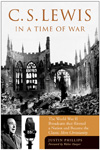 James Welch was the Director of Religious Broadcasting for the BBC during World War II. Welch, along with Eric Fenn, was responsible for bringing C.S. Lewis to the BBC during WWII to give several series of talks over the airwaves that would eventually be written and bound into Lewis’ classic, Mere Christianity. Without Welch and Fenn, Mere Christianity would never have been written, and C.S. Lewis would probably not be a household name in Evangelical circles. But it was not entertainment or academic aspirations that led Welch to proposition Lewis for these talks, in C.S. Lewis in a Time of War, Justin Phillps explains that Welch had a much stronger drive, a drive to see the gospel proclaimed to all nations.
James Welch was the Director of Religious Broadcasting for the BBC during World War II. Welch, along with Eric Fenn, was responsible for bringing C.S. Lewis to the BBC during WWII to give several series of talks over the airwaves that would eventually be written and bound into Lewis’ classic, Mere Christianity. Without Welch and Fenn, Mere Christianity would never have been written, and C.S. Lewis would probably not be a household name in Evangelical circles. But it was not entertainment or academic aspirations that led Welch to proposition Lewis for these talks, in C.S. Lewis in a Time of War, Justin Phillps explains that Welch had a much stronger drive, a drive to see the gospel proclaimed to all nations.
Welch felt strongly that the divisions of war did not diminish the relevance of the word of God or its direction. If anything, it made the gospel more important than ever. Christ’s offer of forgiveness to all who turn to him in repentance and faith is universal. The claim of Christ to be the route to God himself–the Way, the Truth, and the life–applied in all times in all places. It applied equally to men and women of all nationalities. Germany might be the enemy, but the Christian gospel had equally to speak to Germans as to the English. Religious broadcasting ‘has had to speak the word of God who is Lord, Judge, and Father of all men, of Germans equally with the British, of Japanese equally with the Americans. For religious broadcasting is, fundamentally, the broadcasting of the truth about God and of the truth give by God.’

